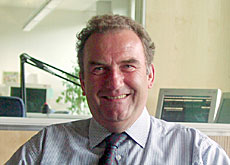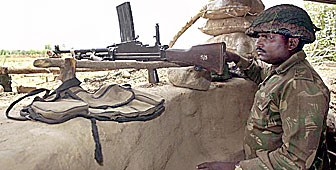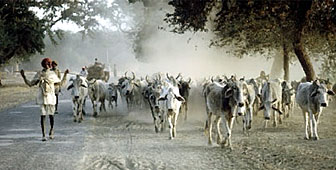Swiss seek human rights dialogue with Pakistan

Swiss diplomat Christian Dunant says his country is looking to restart a human rights dialogue with Pakistan, six years after talks on the issue were suspended.
In an interview with swissinfo, Switzerland’s ambassador to Islamabad is also optimistic about the outcome of negotiations between Pakistan and India.
The nuclear neighbours have fought two wars over the disputed region of Kashmir.
Dunant has served as Switzerland’s representative in Pakistan for nearly five years. He took up his post in January 2000, three months after the country’s president, Pervez Musharraf, seized power in a military coup.
Dunant’s tour of duty in Islamabad – from where he also served as Swiss ambassador to neighbouring Afghanistan – comes to an end in November.
During his time in office, he has been responsible for bilateral relations with Afghanistan and has made regular trips to Kabul to hold talks with the post-Taliban government.
swissinfo: To what extent has the tension between Pakistan and India – and the desire of the international community to defuse it – dominated your time in Islamabad?
Christian Dunant: The relationship between India and Pakistan has always been one of my priorities. It quickly emerged after President Musharraf took power that he was willing to improve relations with India.
We have followed developments closely, but have not really been able to become involved because neither country is prepared to let others have a say in the future of Kashmir. So it’s very difficult for a small country like Switzerland to have any influence – even though we, as a neutral state, are very well respected by both sides.
I must say that for the first time since I arrived in Pakistan nearly five years ago I am quietly optimistic about the development of the country’s relationship with India… and I hope that they will one day be able to live normally together.
swissinfo: Switzerland is currently pursuing a human rights dialogue with certain countries, notably Iran and China. Is this also true of Pakistan?
C.D.: Our dialogue with Pakistan on human rights was suspended in 1998 [after Pakistan and India carried out nuclear tests]. And after Musharraf took power we decided to freeze this dialogue.
But over the past few months we have started to try to restart talks. Discussions are currently underway with the authorities in Islamabad, and I hope we can begin again towards the end of the year. I do believe that the willingness is there.
We are already helping to finance some projects to help promote human rights in Pakistan and are working with the government to change text books in schools, for example, to make children more aware of human rights. We are also supporting programmes to help women in prisons, so we are quite active in this area.
swissinfo: What are likely to be the key challenges for your successor in terms of improving bilateral ties between Bern and Islamabad?
C.D.: My successor’s main task will be to monitor the progress of Pakistan’s economy to see if we can improve our bilateral relationship through greater trade ties.
It will also be important to watch how the political situation evolves and to see if democracy really is installed in the country, because this will have a direct influence on our relations with Pakistan.
Another goal we have is to negotiate an agreement with Islamabad on the repatriation of those of its citizens who are living illegally in Switzerland.
swissinfo: Turning to Afghanistan, do you think that October’s presidential election will be a decisive moment for the country?
C.D.: I don’t think it’s going to be difficult for [Interim President] Hamid Karzai to win the election. But I am not overly optimistic that this will bring peace and stability to the country.
I have been to Afghanistan four times in the past eight months and every time I go I see a deterioration in security. People are becoming more nervous… partly because of the upcoming election but also because peace is very difficult when you still have powerful warlords and a very weak central government.
Karzai is doing what he can but his options are very limited. You have the ex-Taliban who are active in the south of the country along the border with Pakistan and they are a major security threat.
swissinfo: Aid agencies have expressed similar concerns about the deterioration in security. What are the implications for Swiss development work in the country?
C.D.: Well, we have no plans at present to close down our development aid bureau in Kabul. Of course, it’s more difficult for our staff to work, but at the moment it is still possible. We are, however, always prepared for the worst. If something should happen, we will not hesitate to close the office, because I will not risk the lives of my staff there if things get too dangerous.
swissinfo: How might Switzerland continue to help with the reconstruction of Afghanistan?
C.D.: Our focus is currently on humanitarian aid, but it is our intention to move towards helping with more long-term development and reconstruction projects.
Where we might be able to help in future is in the country’s provinces, which are going to have to find their own system and relations with central government. This is certainly an area where Switzerland, with its federal structure, could offer help if the Afghan people and the authorities want it.
swissinfo-interview: Ramsey Zarifeh
Christian Dunant was born in Geneva in 1950 and joined the Swiss foreign ministry in 1976.
In 1978 he was appointed deputy chief of mission at the Swiss embassy in Kinshasa. He later served at embassies in Ottawa and Paris.
In 1996 he was named deputy head of the Swiss Mission to the International Organisations in Geneva.

In compliance with the JTI standards
More: SWI swissinfo.ch certified by the Journalism Trust Initiative











You can find an overview of ongoing debates with our journalists here . Please join us!
If you want to start a conversation about a topic raised in this article or want to report factual errors, email us at english@swissinfo.ch.